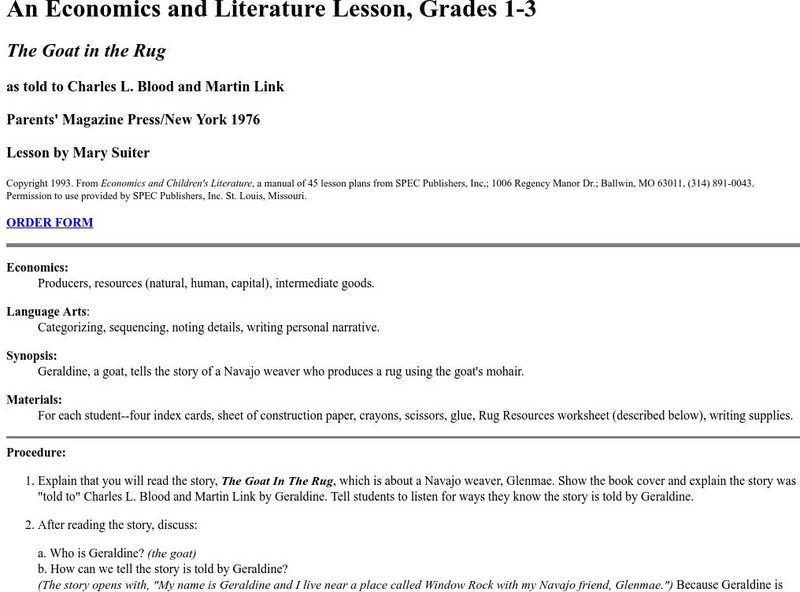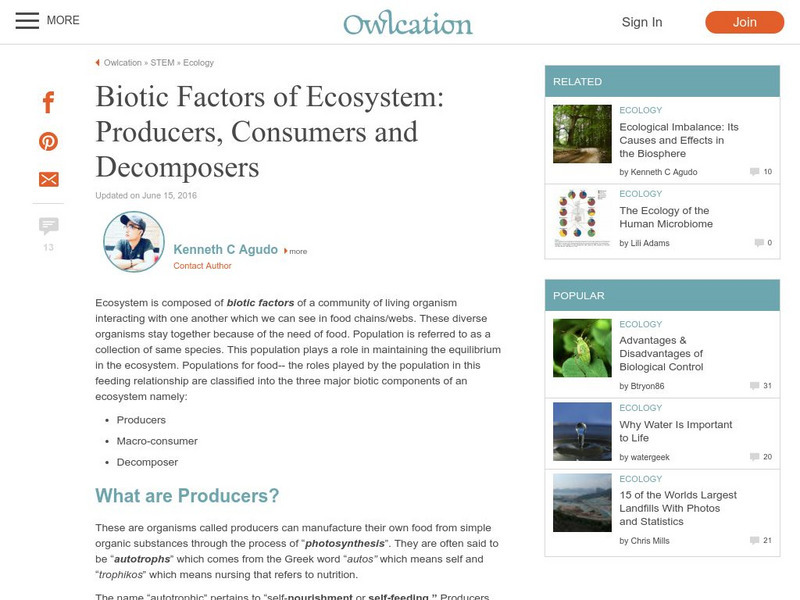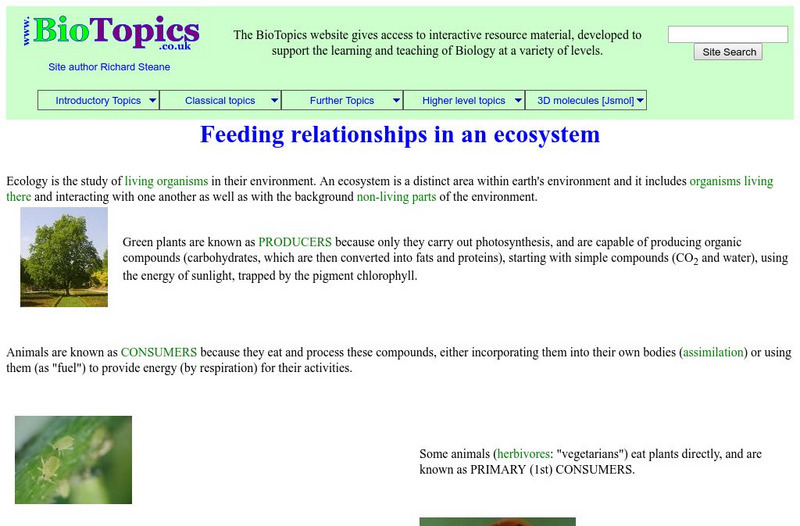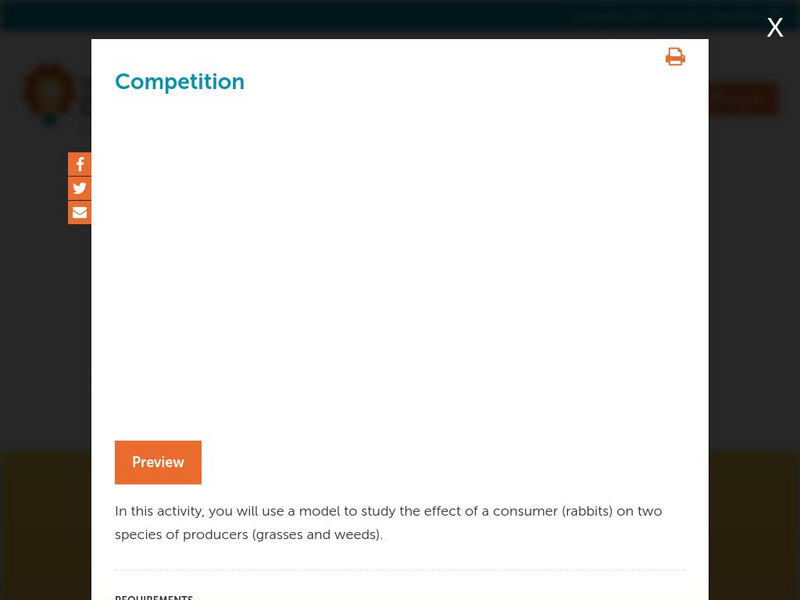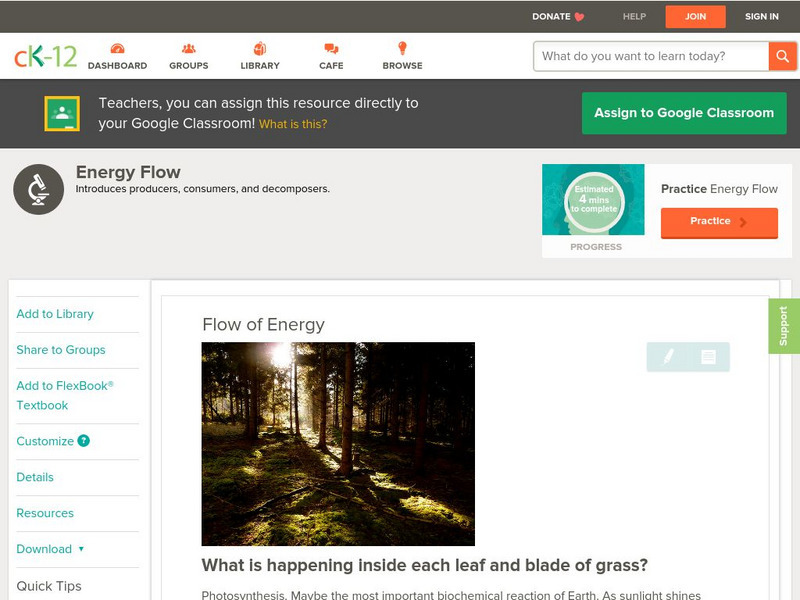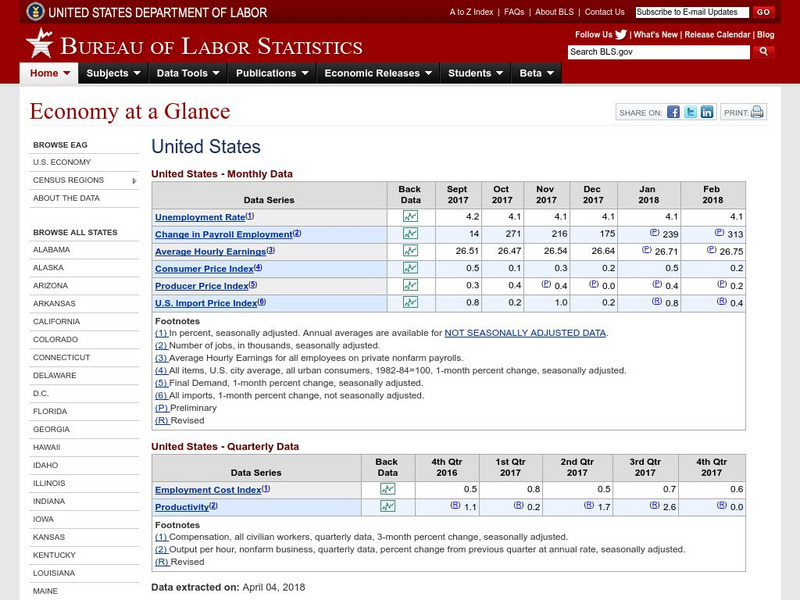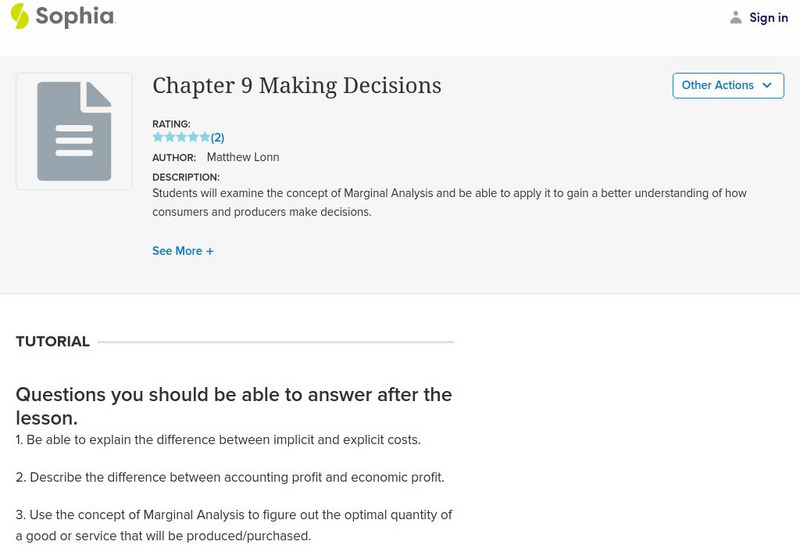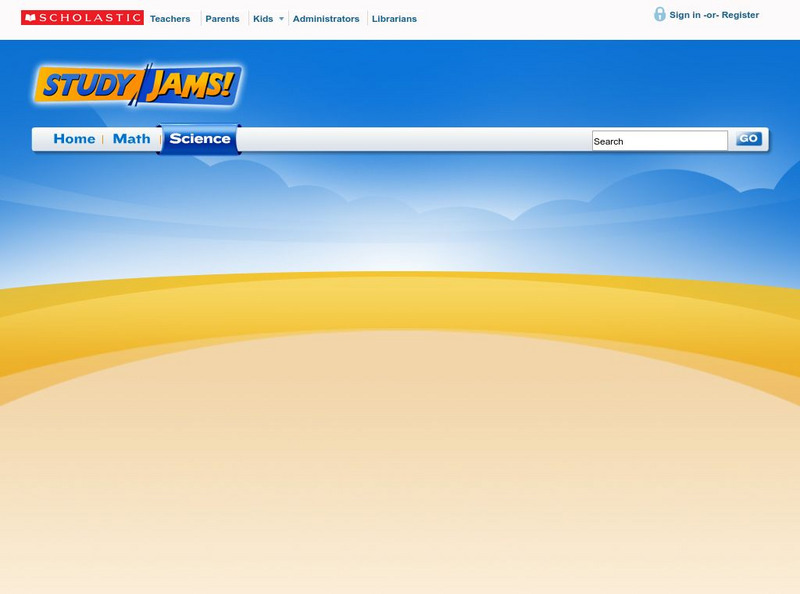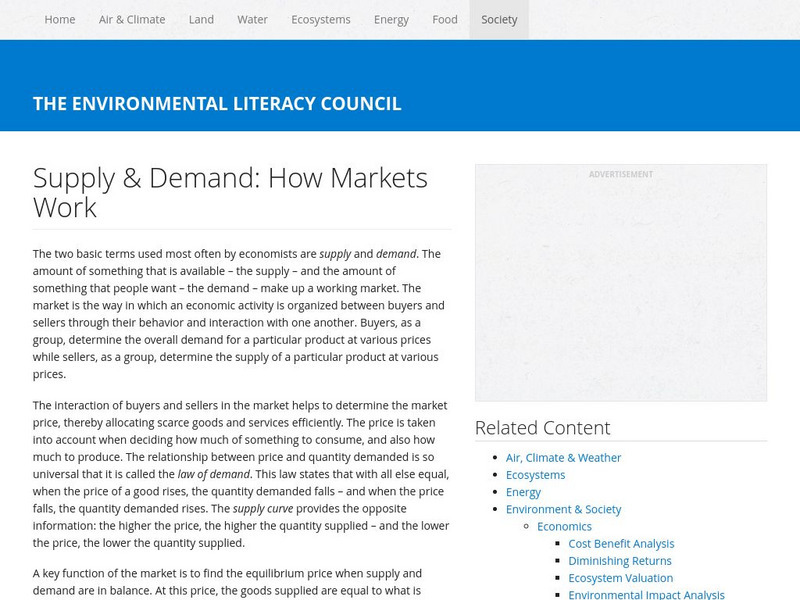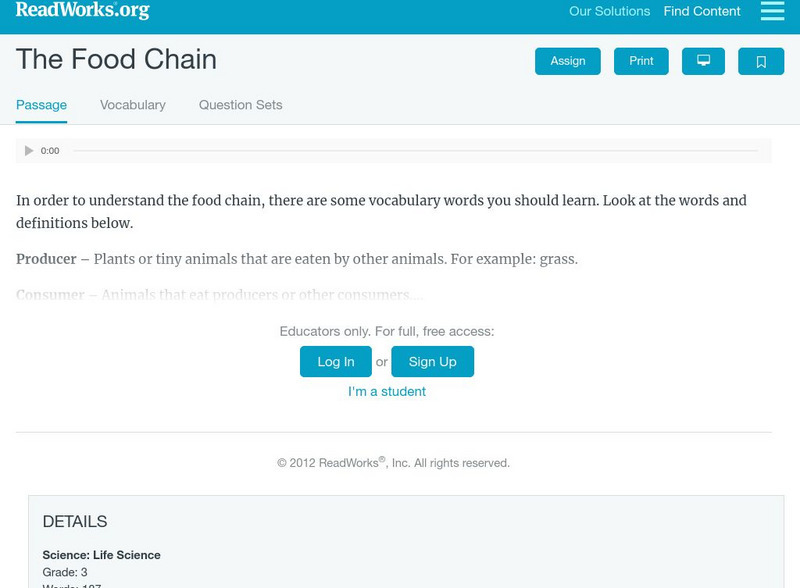Hi, what do you want to do?
University of Nebraska Omaha
An Economics and Literature Lesson: The Goat in the Rug
This is a lesson plan geared toward first through third grades, cross-curricular, dealing with economics and literature. "Learn about economics: producers, resources (natural, human, capital), intermediate goods; and Language Arts:...
SMART Technologies
Smart: Energy Flow in an Ecosystem
Students learn about Abiotic and Biotic Factors and how they affect the ecosystem in which an animal might live in.
Council for Economic Education
Econ Ed Link: Bringing the Market to the Farm
This printable lesson discusses producers and consumers from an agricultural perspective. It focuses on choices that the consumer has with regard to purchasing agricultural goods (e.g. fruits and vegetables). As an example, it uses...
Other
Hub Pages: Biotic Factors of Ecosystem: Producers, Consumers and Decomposers
An ecosystem is composed of biotic factors of a community of living organisms interacting with one another which we can see in food chains/webs. These diverse organisms stay together because of the need of food. Population is referred to...
Science Struck
Science Struck: Learn All About the Ocean Food Chain
Read about the different predators, consumers, and producers that make up an ocean food chain.
Bio Topics
Bio Topics: Feeding Relationships in an Ecosystem
This overview of feeding relationships illustrates to students the trophic levels of different organisms in an ecosystem. Hover the mouse over different terms to see their definitions.
Concord Consortium
Concord Consortium: Stem Resources: Competition
An interactive activity where students study how two species of producers are affected by a consumer. By completing several virtual experiments and collecting data, students will be able to summarize what plants can do to defend...
University of Michigan
University of Michigan: The Concept of the Ecosystem
Lesson looks at the definition of an ecosystem, biogeochemical cycles, and factors responsible for the differences between ecosystems.
CK-12 Foundation
Ck 12: Biology: Flow of Energy
[Free Registration/Login may be required to access all resource tools.] Describes how energy flows through an ecosystem.
TeachEngineering
Teach Engineering: Constructing Sonoran Desert Food Chains and Food Webs
Is the food chain shown above accurate? Does the first link depict a producer, the second link a herbivore, and the third link an omnivore / carnivore? Students must correctly determine whether a species is a producer or consumer, and...
US Department of Labor
Bureau of Labor Statistics: u.s. Economy at a Glance
The seven major economic indicators for the U.S. economy are listed here in an easy to read chart. The seven indicators are unemployment rate, change in hourly employment, average hourly earnings, consumer price index, producer price...
Massachusetts Institute of Technology
Mit: Open Course Ware: Principles of Microeconomics
An introductory course in the fundamentals of microeconomics. Includes a list of suggested readings, lecture notes, assignments, and exams.
Tom Richey
Slide Share: Ecosystems and You
Slideshow that looks at energy flow in an ecosystem. Explains what an ecosystem is, how energy flows through it, the producers and consumers of energy, and food chains. Links to a video about plastic debris in the ocean.
Shmoop University
Shmoop: Ecosystem Energy Flow
Explains the processes by which energy flows through an ecosystem. Covers the meanings of key vocabulary, e.g., types of producers and consumers, trophic levels, food webs, and the energy pyramid.
Khan Academy
Khan Academy: Lesson Overview: Taxation and Deadweight Loss
This article provides an overview of Taxation and Deadweight Loss. When a tax is imposed on a market it will reduce the quantity that will be sold in the market. Whenever the quantity sold in the market is not the equilibrium quantity,...
Other
The Habitable Planet Simulation
This activity is designed to accompany an interactive on the Annenberg Learner website. Students investigate the changes that take place in an ecosystem when they alter the organisms in a food web. As they work with the simulation, they...
Annenberg Foundation
Annenberg Learner: The Habitable Planet: Ecosystems: Energy Flow Through
Detailed explanation of the processes by which energy flows through an ecosystem. Scroll down and open Section 3.
Other
Trinity P3: What Are the Biggest Issues and Challenges Facing Media Today?
Lists some of the many major changes that the media industry is going through, at all levels and in all roles from producer to marketer to consumer. The results of an industry survey are described and a detailed summary is provided...
Sophia Learning
Sophia: Making Decisions
Notes and a video clip provide students with an introduction to the idea of marginal analysis and of how consumers and producers make decisions.
University of North Carolina
University of North Carolina: Perfect Competition
This site shows cost curves for a firm in a perfectly competitive market, and has an interactive graph to show what their profit margin is at various levels of production.
Council for Economic Education
Econ Ed Link: Chevy Volt It's Electric!
The costs and benefits of owning an electric or hybrid car will be evaluated in this activity. By reading and researching the history of the production of electric cars, the activity allows students to understand how this market has...
Scholastic
Scholastic: Study Jams! Science: Ecosystems
A video and a short multiple-choice quiz on the topic of ecosystems, covering biotic and abiotic factors, and the roles organisms play in an ecosystem.
The Environmental Literacy Council
Environmental Literacy Council: Supply and Demand: How Markets Work
An article on supply and demand and how markets work. Related links for teachers.
Read Works
Read Works: The Food Chain
[Free Registration/Login Required] An informational text explaining important vocabulary involving the food chain. A question sheet is available to help students build skills in reading comprehension.





